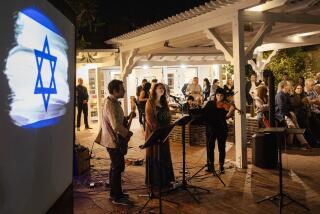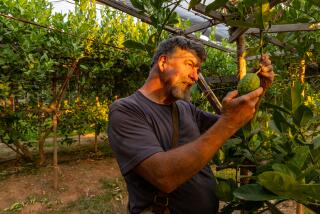Site Near Where Jesus Is Said to Have Been Immersed : Israel Kibbutz Runs Booming Business in Baptizing Christians
- Share via
TEVERYA, Israel — The kibbutzim of Israel, which began more than 70 years ago as collective agricultural settlements, has diversified into some unusual businesses over the years. But none can top Kibbutz Kinneret.
Kibbutz Kinneret is in the Christian baptism business.
Just south of here, at the place where the Jordan River flows out of the Sea of Galilee, Kibbutz Kinneret runs the Yardenit baptismal site, which is visited annually by thousands of Christian pilgrims wishing to immerse themselves in the river where Jesus is said to have been baptized.
Amenities Provided
The Jewish kibbutzniks do not do the baptizing, of course. Christian ministers do that. But the kibbutz provides all the amenities.
A pilgrim can rent a ceremonial white robe for $2 and a towel for $1. But most of the profits come from a snack bar and souvenir shop at the site, according to Abe Joffe, assistant manager of the baptism site.
The best-selling items are vials of Jordan River water, in $3 and $5 sizes, and T-shirts (extra large for $8) that advertise: “I was baptized in the Jordan River.”
Do-it-yourselfers can buy a plastic vial for 50 cents and get their own water. And for those intent on something a little different, there are bottles of Miracle Wine at $5.50 to $7 and painted ostrich eggs at $60 apiece.
The idea for a special Jordan River baptismal site was the government’s. The kibbutz got involved as an afterthought.
“Before, people used to go in (the river) along the road there,” Daniel Rossing, director of the department for Christian communities of the Religious Affairs Ministry, said in an interview at his office in Jerusalem. “It wasn’t safe. People were drowning.”
So the government-owned Tourist Development Corp. drafted plans for an off-road site on a part of the kibbutz that used to be swampland. The ministry took representatives of the various Christian communities to the site and asked for suggestions, Rossing said.
At first, some clerics were concerned that Yardenit would detract from what tradition holds to be the actual site where Jesus was baptized, about 65 miles to the south and nearer to where the Jordan flows into the Dead Sea. But that area is in a densely mined military zone that extends along the border between the Kingdom of Jordan and the Israeli-occupied West Bank of the river. And it is open to visitors only two days a year--one in the fall for Roman Catholic pilgrims and one in January for the Greek Orthodox.
Convenient Alternative
The government was not trying to create a counterfeit site, Rossing said, but to provide a convenient alternative for pilgrims who want to capture the spirit, if not the geography, of the original.
The final product looks like a small outdoor amphitheater at the water’s edge, surrounded by a dense growth of tamarisk, willow, poplar and eucalyptus trees. Pilgrims descend into the water on a gently sloping concrete ramp with metal handrails. A semicircular section of the bank has been redone in three tiers of concrete and stone for other visitors to pray or simply to watch.
“This is where we come and renew our rebirth,” said Kinfe Michael, a secretary to the Ethiopian Orthodox archbishop of Jerusalem. “It reminds us that once again we are children of God through Christ Jesus.”
Michael was at Yardenit along with three pilgrims from Ethiopia, including a 10-year-old boy who screamed in protest as the cleric dunked him in the greenish waters of the Jordan.
Kibbutz Kinneret, which at 74 is the second-oldest such settlement in the country, took over Yardenit’s operation after the government prepared the site.
“The original members were reluctant” to diversify, Joffe said. “They were purists. They wanted only agriculture and saw any other business as against the ethics of the kibbutz.”
But more open-minded members prevailed and today half of Kibbutz Kinneret’s income derives from non-agricultural ventures.
Still, Joffe acknowledged, if it had not been for the government, “I don’t think we’d have thought of doing baptisms.”
‘Very Good Business’
Now in its sixth year, Yardenit has proved to be a “very good business,” said Kibbutz Kinneret’s treasurer, Yossi Zamutski. He will not disclose specific figures, but he said the baptismal operation generates about half the profits of a kibbutz-owned factory that makes plastic containers.
Joffe said he is not sure how many visitors Yardenit attracts every year. In the summer, particularly, many tourists come not to be baptized but just for a reprieve from the intense heat and humidity of the Jordan Valley. Teverya, which used to be called Tiberias, is one of the lowest towns on Earth, about 600 feet below sea level, and summer temperatures frequently top 100 degrees Fahrenheit.
The boom months for baptisms are in the winter around Christmas and in the spring around Easter, when Christian pilgrims flock to the Holy Land.
“We get as many as five groups a day in the winter,” Joffe said, and each group may number up to 120 pilgrims. “You have people from all over the world coming here.”
At first, Joffe and a co-worker, Elon Hooker, who runs the souvenir store, did not know quite what to expect, particularly from evangelical groups.
“When they get into ecstasy, they start screaming and shouting,” said Joffe, an immigrant from South Africa. “I thought something had gone wrong.”
But now it is all in a day’s work.
Hooker said Yardenit’s clients include Jews for Jesus--Jewish converts to Christianity--who sometimes wear a Star of David with a cross in the center. Given the long history of Christian anti-Semitism and forced conversion of Jews, Israel is acutely sensitive on this issue; it has formally outlawed Christian proselytizing. But Hooker said it does not bother him.
“I was more religious in (his native) England than I am here in Israel,” he said.
He concedes that it is unusual for a Jewish kibbutz to be in the business of baptizing Christians.
“One of the reasons I came to Israel was that I had encountered some anti-Semitism,” Hooker said. “And now I’m serving Christians. It’s strange, really.”
However, he added, “I find the people who come here are very pro-Jewish. They seem very warm toward Israel and the Jewish people.”
More to Read
Sign up for Essential California
The most important California stories and recommendations in your inbox every morning.
You may occasionally receive promotional content from the Los Angeles Times.










